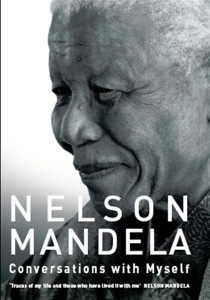Mandela’s musings a joy to read
By Rekha Bhattacharjee
Nelson Mandela has released a new book on 12 October 2010 on his life in which he urges the world not to view him as a saint. He says he has suffered “weaknesses, errors and indiscretions”.
“Conversations With Myself” brings together personal papers and hours of recordings with an unfinished autobiography to show the private life of South Africa’s first black President.
As the man credited for saving South Africa from race war, the man most revered in the world as a vital force in the fight for human rights and racial equality, Nelson Mandela has emerged as the most significant moral leader since Mahatma Gandhi.
Tributes poured in for Nelson Mandela as he celebrated his 92nd birthday on 18 July.
As a tribute to the revered leader, I am reviewing his famous book ‘A long walk to freedom’.
The colour consciousness of the South African prison authorities was such that white prisoners received white sugar and white bread while coloureds were given brown sugar and brown bread.
The colour of his food, however, was the least of Nelson Mandela’s problem during his 27 years on Robben Island, the harshest outpost of the South African penal system, spent doing hard labour in extremes of heat and cold with only one letter and one visitor every six months – that too for half an hour through a thick glass partition.
How does any human being emerge from such an experience, as Mandela did, with his personality, values, humour and dignity intact?
He has a wicked sense of humour. Expressed by the absurdity of his reaction, he relates with a twinkle in his eye his first trip in 1962 to enlist support from sympathetic African nations and travelled from Ghana to Ethiopia. He felt a surge of panic when he saw the pilot. The pilot was black. In South Africa he had never seen a black pilot. Could a black pilot fly a plane he asked himself? It took just a second for Africa’s greatest nationalist leader to realise how some of the seeds of apartheid had sneaked into his own mind while he wasn’t looking, making him think that Africans were inferior and flying was a white man’s job!
It is this sense that made him find humour in his life over flowing with grimness, decades passing by with no joy or success in sight.
It is said that happy childhood is usually a guarantee of adult sanity. Mandela’s was idyllic. Moreover, his unshakeable belief in himself and his cause sustained him through all the phases of his life.
His life is so simply described – when he was training to be a lawyer, the time he was banned from becoming a member of the ANC, the notorious trial in 1962, his 27 years of imprisonment and the bold step he took, despite the grave misgivings of his colleagues in the ANC – to begin talks with F.W. de Klerk.
Robben Island authorities designed humiliations to break the spirit of the man but Mandela refused to submit.
In an incident, he was ordered to wear short trousers. Mandela refused. He demanded long trousers – in the end they threw at him a tacky pair of long trousers. It pleased him more than receiving a three-piece suit. But once he found that other prisoners were not given the same – he handed that back.
The control of the man! The six monthly letters were a moment of uncontrolled ecstasy but Mandela would not rush forward to grab the letter, as he felt like doing. He did not want the warders to have the satisfaction of seeing his eagerness.
Although Mandela’s spirit never broke during the many ordeals but he was mentally tormented and heart broken at the thought of his family suffering due to his involvement in the freedom struggle and personal inability to fulfill his responsibilities. This regret permeates through out the book. It was Mandela’s private agony, his deep sorrow at not being able to fulfill his duties as a father, husband, brother and son. But he did not dwell in it or express himself in the pages much. He never felt comfortable speaking of his feelings. Thus his response about Winnie and family is very brief – a response of a private man.
Mandela’s generosity of spirit and humanity shines from every page of this awe inspiring book.
He is full of optimism when he writes, “I never considered the possibility that I would emerge from prison one day. I never thought a life sentence truly meant life – that I would die behind bars. I always knew that some day I would once again feel the grass under my feet and walk in sunshine a free man.”
Short URL: https://indiandownunder.com.au/?p=163

